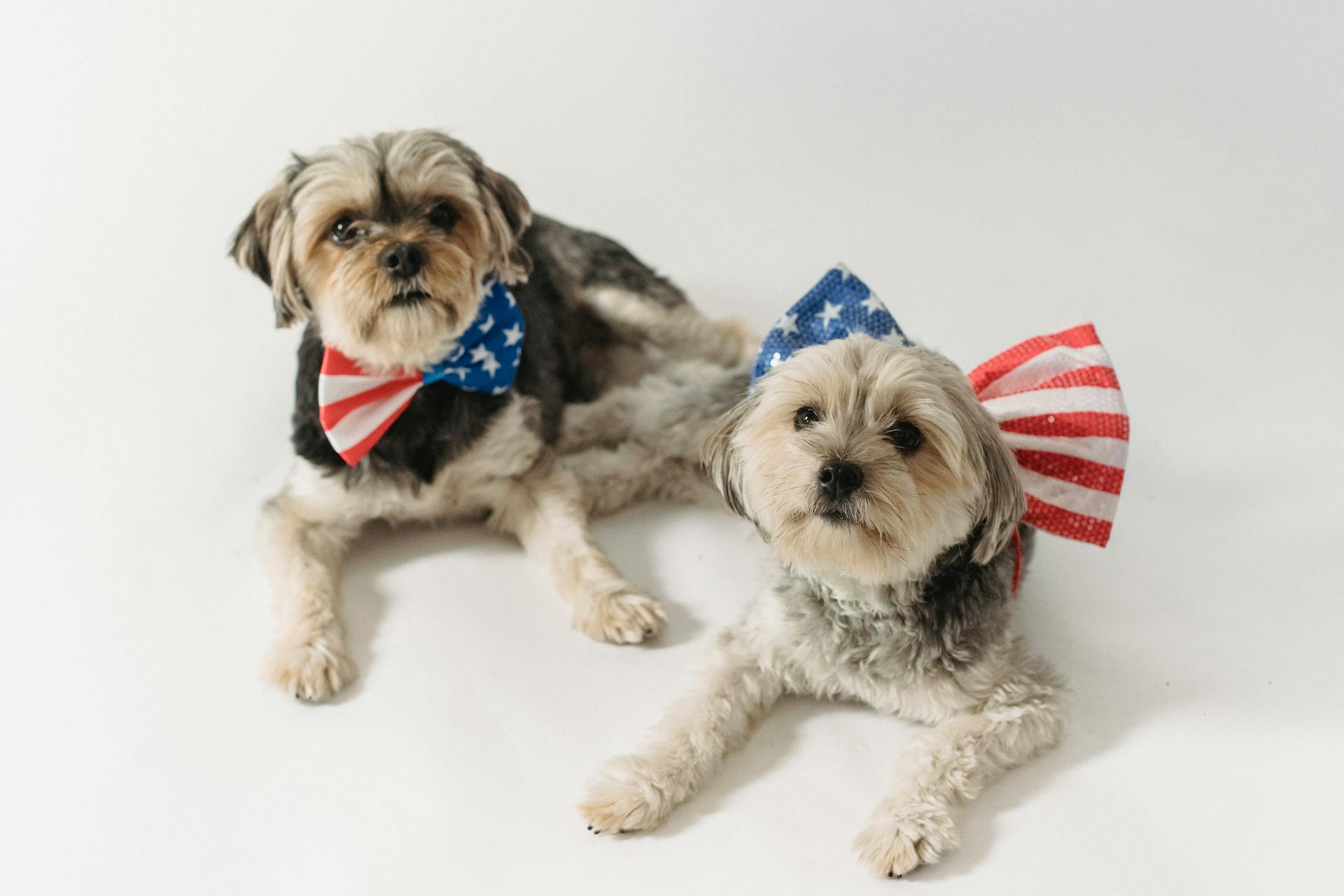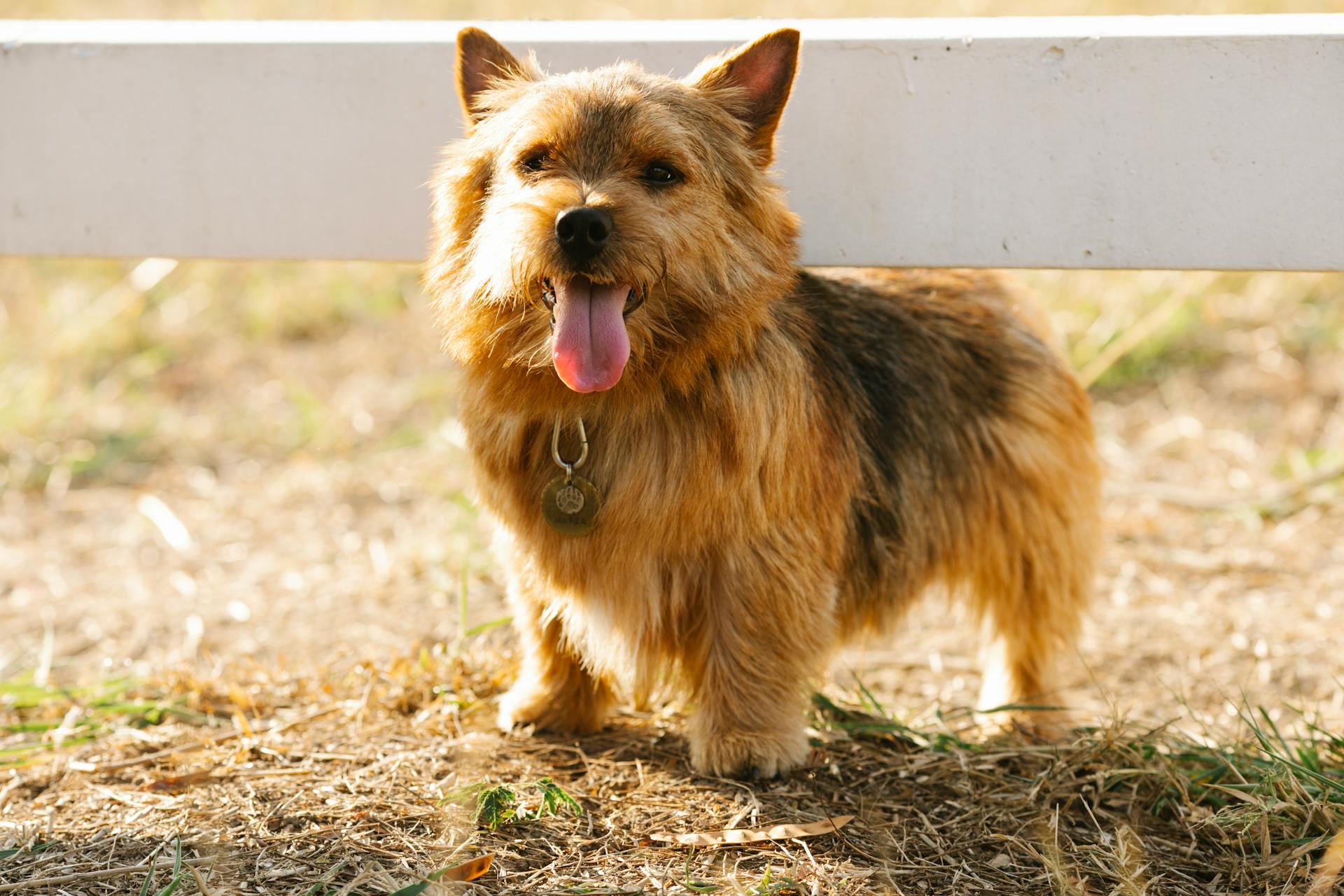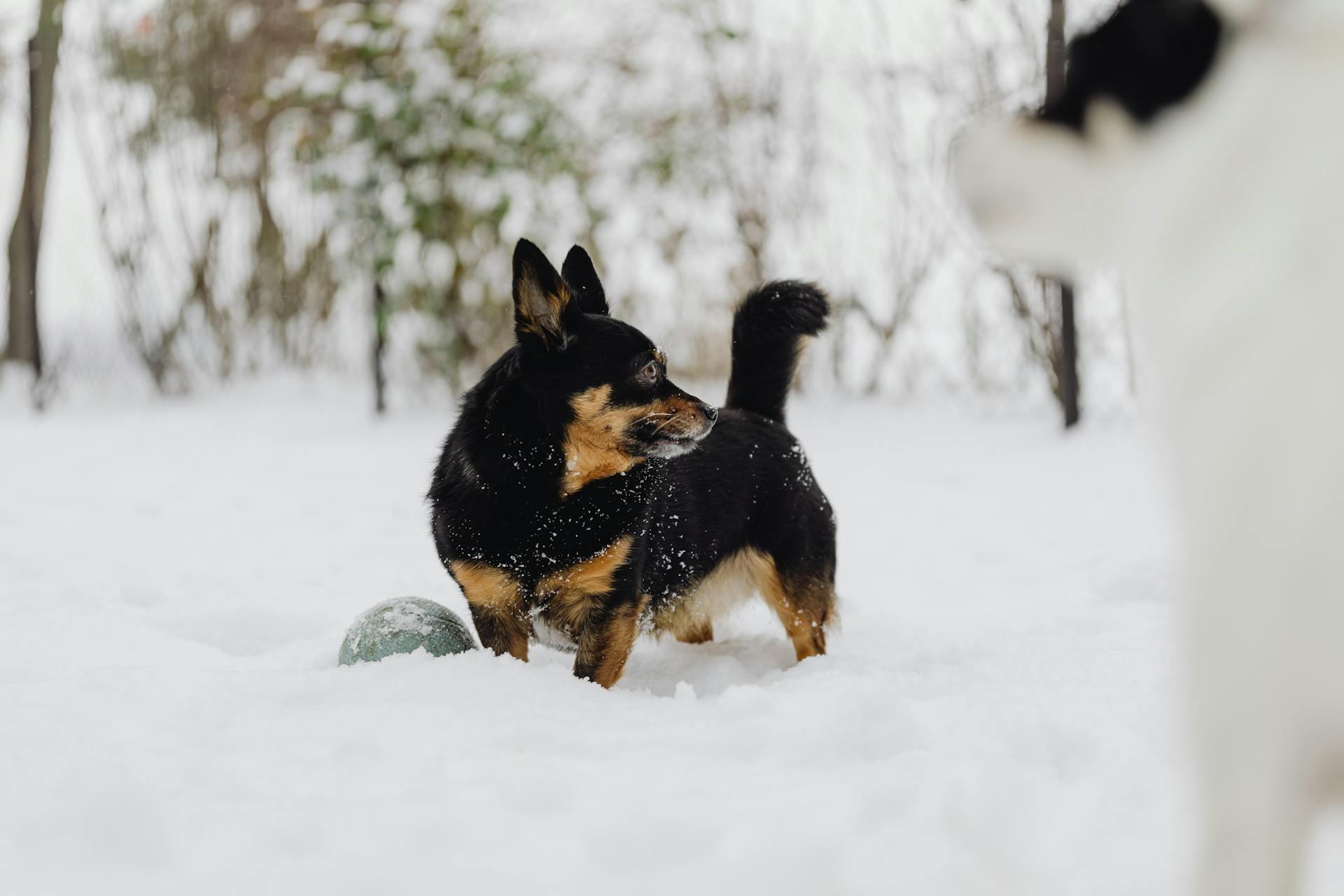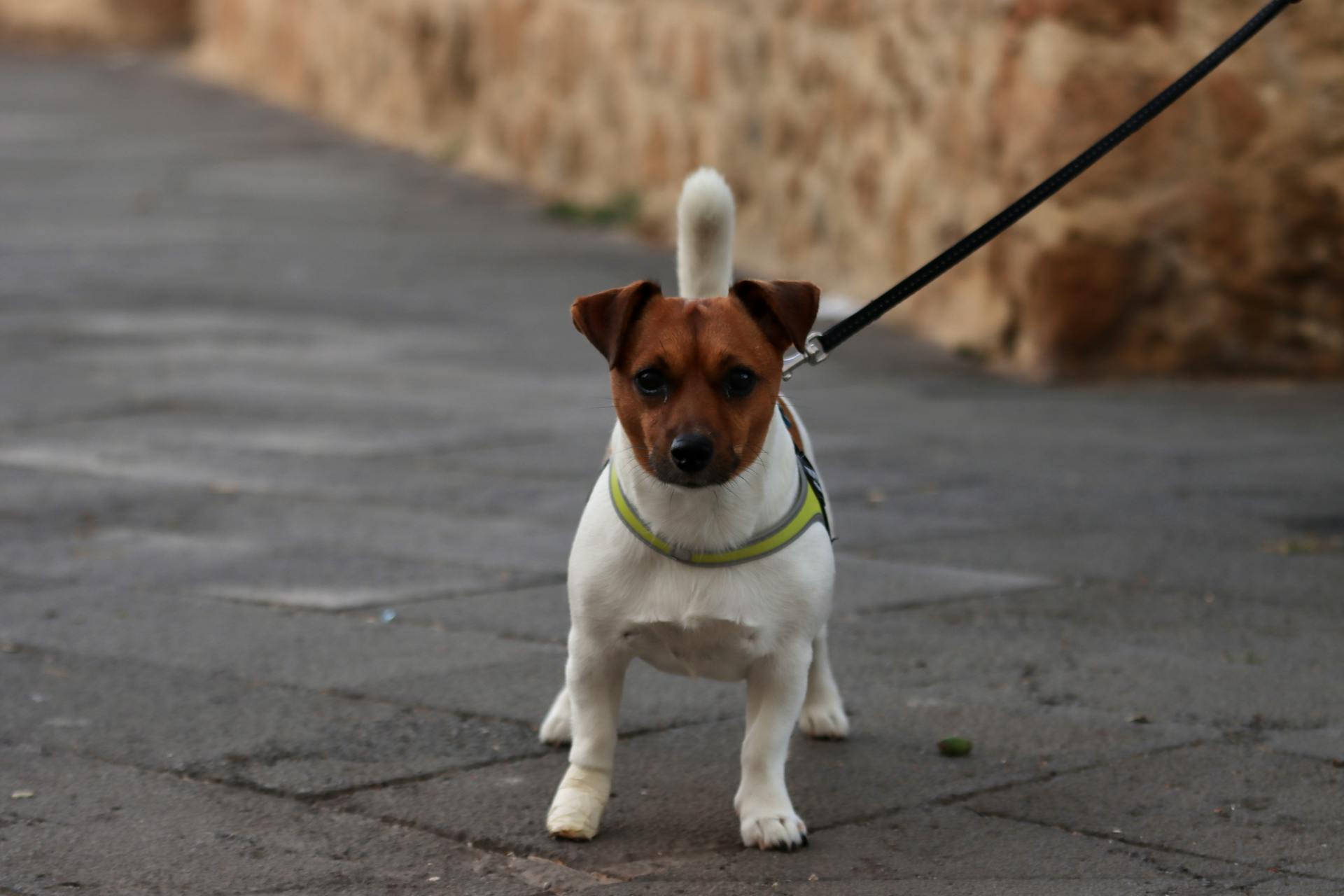
Yorkiepoos are a cross between a Yorkshire Terrier and a Poodle, making them a unique and lovable breed. They typically weigh between 7-15 pounds and stand 6-10 inches tall.
Their small size requires careful consideration when it comes to exercise and living arrangements. They need regular walks and playtime to stay happy and healthy.
One of the most distinctive features of Yorkiepoos is their low-shedding coat, which makes them a great choice for people with allergies. This coat requires regular grooming to prevent matting and tangling.
Yorkiepoos are intelligent and trainable, but they can be strong-willed at times, requiring patient and consistent training.
Care and Nutrition
Yorkiepoos require a daily routine that includes 20-30 minutes of exercise, which is perfect for pet parents living in smaller quarters or those who are new to dog ownership.
They also need mental stimulation to prevent behavioral issues like excessive barking and separation anxiety, which can be addressed with early positive reinforcement training.
A consistent brushing routine is essential to keep their coat in fine shape, especially during the spring and fall when they shed more.
Feeding your Yorkiepoo the right type and amount of dog food is crucial to maintaining a healthy weight and preventing health conditions.
Commercial dog food from reputable brands like Hill's Science Diet, Purina Pro Plan, and Royal Canin are great options, and be sure to follow the feeding schedule recommended by the manufacturer.
Yorkiepoo puppies under 1 year old should eat three to four times a day, while adult Yorkiepoos should eat twice a day, once in the morning and once at night.
Pet Care
Yorkiepoos require daily exercise, about 30 minutes of play or walking, to stay happy and healthy. This can be as simple as a short walk around the block or a quick play session in the backyard.
Their small size belies their energetic nature, so they need plenty of physical and mental stimulation to prevent behavioral issues like excessive barking and separation anxiety. Consistent positive-reinforcement training and socialization can help prevent these quirks.
A daily brushing routine can help keep your Yorkiepoo's coat in fine shape and control shedding, especially during spring and fall. This also helps reduce dander, which can minimize allergens.
Yorkiepoos need regular grooming, including bathing and hair trimming, to keep their coat looking its best. If your pup has a poodle-style coat, visits to a professional groomer every 6-8 weeks will keep her looking spiffy.
Small breed dogs like Yorkiepoos are prone to dental disease, so regular home dental care and annual vet checkups are crucial. Daily brushing with canine-safe toothpaste and a toothbrush can help prevent dental disease, but annual dental cleanings at a veterinary office are also necessary to clean off calcified tartar.
What to Feed a Pet
Feeding your pet the right food is crucial for their overall health and well-being.
A complete and balanced diet is essential for your pet's nutritional needs, and they shouldn't require supplements unless a veterinarian recommends them.
Treats should make up only 10% of your dog's calorie intake and never replace a meal, according to the Pet Food Institute.
Feeding your pet too many treats can lead to weight gain and other health issues.
Commercial dog food made by reputable brands such as Hill's Science Diet, Purina Pro Plan, Royal Canin, Iams, and Eukanuba is a good option for your pet.
These brands create fixed formulation foods, so you know each bag is the same as the time before.
Any food you feed your dog should be approved by the Association of American Feed Control Officials (AAFCO).
Feeding your pet twice a day, once in the morning and once at night, is a good schedule to maintain.
Yorkiepoo puppies less than 1 year old should eat three to four times a day on a consistent schedule to maintain their blood sugar and avoid hypoglycemia.
The best quantity of food to feed your pet depends on their age, size, activity level, and other factors, so it's best to consult with your veterinarian.
You can also use the guidance printed on your dog food bag as a resource to determine how much to feed your pet.
Size
Size is an important aspect to consider when it comes to Yorkie Poo care and nutrition. Their adult size can range from 3 to 14 pounds, with a height of up to 15 inches from the shoulder.
Yorkie Poo puppies can reach their full adult size between 6 and 12 months old, depending on their size. This growth period can vary, with some Yorkie Poo puppies reaching their full size as early as 6 months old.
To give you a better idea, here are some size estimates for adult Teacup Yorkie Poo and Mini Yorkie Poo:
These size estimates can help you plan for your Yorkie Poo's nutritional needs and provide the best possible care for their size and age.
Health and Wellness
Yorkiepoos are generally a healthy breed, but like any mixed-breed dog, they can inherit health issues from their parent breeds.
Genetic testing can help decrease the danger of inheriting particular diseases, and a nutritious diet and routine vet visits can also help avoid or manage some of these health problems.
Some common health issues that Yorkiepoos may experience include atopic dermatitis, Legg-Calve Perthes Disease, and Portosystemic shunt.
Here are some specific health concerns to be aware of:
- Atopic dermatitis: This is the inflammation of the skin caused by poor hygiene or allergies.
- Legg-Calve Perthes Disease: This is the break down of the head of the femur that meets the hip, which can lead to lameness.
- Portosystemic shunt: This is a malformation of the vessels between the liver and the heart.
- Cushing's disease: This is a potential life-threatening condition that affects the adrenal glands.
- Inflammatory Bowel Disease: This is the irritation of the gastrointestinal tract.
- Periodontal disease
- Patellar Luxation: This is the dislocation of the kneecap.
- Epilepsy
Your Yorkiepoo's lifespan could be as long as 15 years, so it's essential to develop a good healthcare plan with your veterinarian to ensure she lives well.
Dogs have 39 chromosomes, and when a male and a female are bred, they pass along 20,000 genes that will be carried on all 39 chromosomes for each of their puppies.
Some key health problems to be aware of in Yorkiepoos include:
- Adrenal disease, which affects the adrenal glands
- Endocrine diseases such as Cushing's syndrome and diabetes
- Liver condition called hepatic microvascular dysplasia
- Spinal disease degenerative myelopathy
- Various eye issues
Both parent breeds of the Yorkiepoo can have joint issues, such as hip dysplasia and patella luxation, which is when the kneecap slips out of place.
Yorkiepoos can also have trouble with collapsing trachea, which causes irritation and coughing, as well as a heart condition known as degenerative mitral valve disease.
Behavior and Training
Yorkiepoos are naturally charming and affectionate dogs, but they can also be stubborn at times. They thrive on consistent mental and physical stimulation, and respond well to positive reinforcement training.
To prevent excess barking, it's essential to keep your Yorkiepoo mentally stimulated through early training and consistent exercise. A Yorkiepoo just might be slightly more complicated to train, but with extraordinary consistency, you can achieve great results.
Yorkiepoos are highly trainable, especially with positive reinforcement techniques like using healthy treats and praise to reward good behaviors. Consistency, patience, and a tough but kind attitude are key to successfully teaching a Yorkiepoo.
These dogs pick up on routines and simple commands quickly, but it's crucial to keep their routines consistent to avoid confusion. Positive reinforcement is key to correcting unwanted behaviors, and with time, your Yorkiepoo will learn new commands.
Yorkiepoos need daily exercise to stay healthy and happy, and two 30-minute walks should be sufficient. However, don't forget to add in some playtime as well, as a lack of physical activity can lead to behavioral problems.
Yorkiepoos are suitable for apartment living due to their petite stature, but they still require proper training and socialization to bond with other dogs and pets. Young children should be watched when playing with Yorkiepoos due to their small size.
Early positive reinforcement training can help curb the pesky Yorkiepoo trait of excessive barking. Clicker training with treats and proper cues can manage this characteristic more effectively.
Yorkiepoos are generally great with children and other pets, but it's essential to exercise caution and start training as soon as you bring them home. Inadequate or improper training can lead to behavioral issues, so be patient and consistent.
Yorkiepoos are extremely social pups and tend to develop attachment to their humans easily, which can lead to separation anxiety. Leaving a Yorkiepoo alone for extended periods is not the best idea, so consider investing in a doggy daycare or hiring a dog walker.
Characteristics and Appearance
Yorkiepoos are one of the smallest dog breeds, typically standing between 7-15 inches tall at the shoulder and weighing 5-15 pounds.
Their size can vary depending on the size of their poodle parent, with toy poodle parents resulting in tinier Yorkiepoos and miniature poodle parents resulting in slightly larger ones.
Yorkiepoos have a variety of coat patterns and colors, including bicolor, tricolor, solid hues, and even calico-like patterns.
Their coats can be wavy, curly, or straight, and while they don't shed much, regular grooming is still essential to prevent matting and tangling.
Some common colors of Yorkiepoos include apricot, silver, cream, chocolate, light brown, red, and sable.
Their eyes are typically brown, and their noses are often inky-black.
Here are some common coat types and characteristics of Yorkiepoos:
Overall, Yorkiepoos are a sweet and intelligent breed that can make great pets for the right owner.
Yorkiepoo Variations
If you're looking to achieve a specific coat type or size, understanding the different generations of Yorkipoos is key.
The F1 Yorkipoo is a mix of 50% Yorkshire Terrier and 50% Poodle, making it a good starting point for those who want to control size, temperament, and coat type.
For a curly coat Yorkie Poo, it's recommended to look into F1b, F1bb, F2b, and F2bb Yorkie Poos, as their genetic makeup consists of at least 75% Poodle.
Here's a breakdown of the different generations:
Yorkipoo Variations Generations
The Yorkipoo generations can be a confusing topic, but understanding them can help you achieve your desired traits in a Yorkipoo. Let's break down what each generation means.
The F1 Yorkipoo is the first-generation cross between a Yorkshire Terrier and a Poodle, with a 50% Yorkshire Terrier and 50% Poodle genetic makeup.
To get a better idea of the genetic makeup, here's a breakdown of the different Yorkipoo generations:
If you're looking for a curly coat Yorkipoo, you may want to consider F1b, F1bb, F2b, and F2bb Yorkie Poos, as their genetic makeup consists of at least 75% Poodle, increasing the chances of inheriting a curly Poodle-like coat.
Teacup
A Teacup Yorkie Poo is a mix of the Yorkshire Terrier and Toy Poodle. If the goal is to achieve smaller pups with curlier hair, we can backcross an F1 or F2 Yorkipoo to a Toy Poodle once again.
To achieve the teacup size, breeders often focus on breeding smaller parents, as this increases the likelihood of producing smaller offspring. This is because size is often a dominant trait in breeding.
By focusing on smaller parents, breeders can increase the chances of producing puppies with the desired teacup size.
If this caught your attention, see: Yorkiepoo Teacup
Fun Activities for
Yorkiepoos are known to thrive in environments that cater to their playful and affectionate nature. They require regular exercise to stay happy and healthy.
Walking is a great way to provide your Yorkiepoo with physical activity and mental stimulation. It's essential to make walking a daily routine, even if it's just a short walk around the block.
Fetch is another fun activity that Yorkiepoos love. It's a great way to engage your dog's natural instinct to chase and retrieve.
Here are some fun activities that you can try with your Yorkiepoo:
- Walking
- Fetch
- Dog park
- Tug-of-war
- Chase
- Obedience training
- Puzzle games
- Cuddle time
Don't forget to include playtime and cuddle time in your Yorkiepoo's daily routine. This will help strengthen your bond with your dog and keep them happy and content.
Frequently Asked Questions
What is the difference between Yorkie and Yorkipoo?
A Yorkie is a purebred Yorkshire Terrier, while a Yorkiepoo is a hybrid breed resulting from a cross between a Yorkshire Terrier and a Poodle. This mix introduces a new size range and potential characteristics to the traditional Yorkie breed.
Does Yorkie Poo bark a lot?
Yorkiepoos can be prone to barking, especially for attention, but proper training and mental stimulation can help minimize excessive barking. With early training and mental stimulation, you can help your Yorkiepoo become a well-behaved companion.
What is the difference between Yorkie Poo and Yorkie?
Yorkie Poo and Yorkie differ in that Yorkie Poo is a crossbreed combining a Yorkshire Terrier with a Poodle, whereas a Yorkie is a purebred Yorkshire Terrier
What is the lifespan of a Yorkie Poo?
A Yorkiepoo's average lifespan is 10-15 years. Proper care, including a balanced diet, exercise, and affection, can help ensure a long and healthy life.
Featured Images: pexels.com


